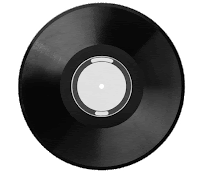"Hitting record shop Sister Ray in London's Soho, my first experience of LPs is to dive nose-first into art gallery of album covers, or records racks if you prefer, around the store. From this visual feast, The Cribs' In The Belly Of The Brazen Bull and Caribou's Swim are selected from the "New Releases", while to really put vinyl to the test, a £150 copy of Led Zeppelin's 1969 albumII is also on the playlist.
Now all I need is my first record player, and Sister Ray owner Phil Barton not only obliges, but he seems distressed when I explain my predicament to him. "Seriously, come downstairs," he orders, leading me through a maze of stacked vinyl to the shop's best record player. TheZeppelin record is retrieved from its sleeve, cued-up and I finally get my first taste of needle-meets-vinyl crackle, it's endearingly enticing isn't it?
However the static is soon forgotten as Whole Lotta Love rumbles out of the speakers and fills the room. Clear and all encompassing, it's as if the audio spectrum has opened up to me and now I'm swimming in the sound, rather than just watching the waves from the beach. Not that I'm trying to sound like I found God or anything, but this has to be the musical version of that revelation. "In MP3s it's all wedged up into one space, everything is compromised," explains my sonic Sherpa, Phil. "Whereas on a record like this on a decent system, you can isolate everything. Just listen to the voice, and now to the drums. Normally, you miss things, like bass players!" The music is like a big, warm melodic bear hug.
Then it's my turn as I shakily lift the needle onto Side A of Caribou's Swim to play my very first record. "As a physical piece of product, it's so much more rewarding than the click of a mouse or the flick of a finger on a screen," suggests Phil as I finally get the record going without scratching it. "You're supposed to turn it over when you get to the end, you engage with it. They're beautiful things as well. Artists in the studio aren't listening to their music on MP3 players stuffed into their ears. This wonderful work that they've created gets mashed down to the size of nothing - a sandwich as opposed to a great big feast." I can almost taste the gravy as the smooth sounds pour out of the speakers and Daniel Snaith's rhythms take on a new fluidity before my ears.
Leaving the shop, I decided to put the experience to a true taste test and retrieve my standardApple earphones, Caribou is duly selected but by comparison it now sounds like a grainy audio mess, while the delicate flowers on the album's artwork are reduced to a pathetic muddle of pixels.
It's amazing to me how I've accepted this version before, and all of a sudden I desperately want (need) to invest in vinyl. It's as though despite having listened to one of my favourite albums countless times, I now feel like I haven't really heard it yet."
This is the same for any musician, recording engineer or mixer. Until you've worked on something, or listened to, something really good (preferably great), you don't have a proper reference point so it's difficult to tell if what you're doing is any good. You can easily fool yourself into thinking that what you're working on is a lot better than it really is.
Among all the things we musicians and engineers have to learn, I believe that this single point is the most important. Working with the best musicians, engineers, producers and gear for at least one project will provide the reference point that you need to up your game from that time on.
----------------------------------
You should follow me on Twitter for daily news and updates on production and the music business.
Don't forget to check out my Music 3.0 blog for tips and tricks on navigating social media and the new music business.



3 comments:
It's frustrating to see the "good" always associated with discovery of Vinyl. As you've mentioned several times in your books, it's not at all an inherently better medium, it's just better than crappy mp3 crushed-within-an-inch-of-its-life music that has become pervasive.
She would have had a similar, if not more engaging experience listening to the master recording via a digital delivery system, with its huge dynamic range... though I totally agree that the physical nature of the record adds something to the whole engagement process. That's lost... for now.
You're right about vinyl being automatically associated with "good." I suspect that the same thing might've happened with most music played on a great sound system.
Like any tool or technology can be used for good or evil (re: MP3, etc.) I still believe vinyl albums beat digital versions of the original recording simply because of its organic procedure/process in capturing Everything it should, in the moment.
Analog's 'warmth' and 'richness' to digital's 'sterile' 'cold' is a comparison one will find too often.
Analog information is real, it's what you're actually hearing with your naturally analog receptive ears. Not a binary coded version of the sound.
Why do many producers first record to analog then to digital if not because of this. And if they can't, would prefer to?
Welcome to read/download a copy of mine of a 1992 article in Guitar Player magazine authored by Neil Young who I humbly share in sentiment and opinion. Yes, it was written in 1992 but read between the lines as well.
Digital Is A Huge Rip-Off Article in Guitar Player 1992.pdf
https://skydrive.live.com/redir?resid=39F80DECA209174E!182&authkey=!AErWasZFUbwvEiE
or
http://sdrv.ms/PGMaK9
Post a Comment